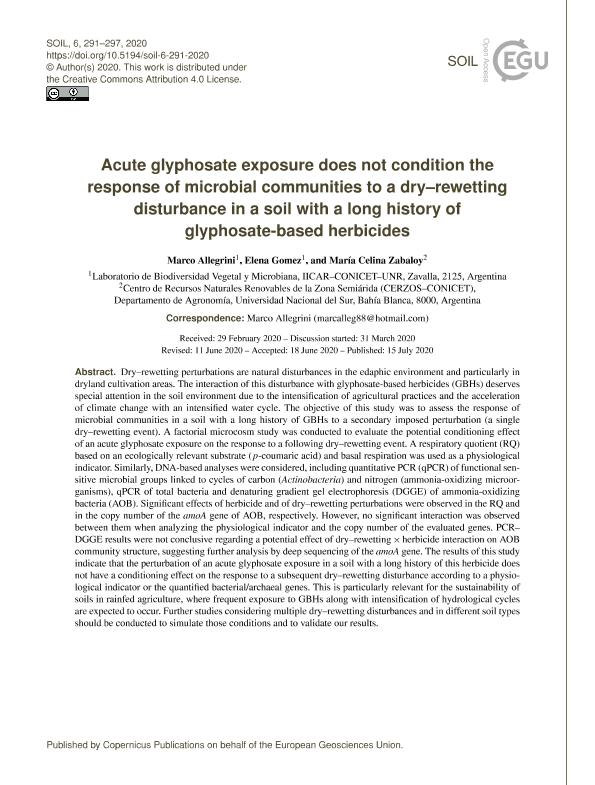Artículo
Acute glyphosate exposure does not condition the response of microbial communities to a dry-rewetting disturbance in a soil with long history of glyphosate-based herbicides
Fecha de publicación:
15/07/2020
Editorial:
Copernicus
Revista:
Soil
e-ISSN:
2199-398X
Idioma:
Inglés
Tipo de recurso:
Artículo publicado
Clasificación temática:
Resumen
Dry-rewetting perturbations are natural disturbances in the edaphic environment and particularly in dryland cultivation areas. The interaction of this disturbance with glyphosate-based herbicides (GBHs) deserves special attention in the soil environment due to the intensification of agricultural practices and the acceleration of climate change with an intensified water cycle. The objective of this study was to assess the response of microbial communities in a soil with long history of GBHs to a secondary imposed perturbation (a single dry-rewetting event). A factorial microcosm study was conducted to evaluate the potential conditioning effect of an acute glyphosate exposure on the response to a following dry-rewetting event. A Respiratory Quotient (RQ) based on an ecologically relevant substrate (p-coumaric acid) and basal respiration was used as physiological indicator. Similarly, DNA-based analyses were considered, including quantitative PCR (qPCR) of functional sensitive microbial groups linked to cycles of carbon (Actinobacteria) and nitrogen (ammonia-oxidizing microorganisms), qPCR of total bacteria and denaturing gradient gel electrophoresis (DGGE) of ammonia-oxidizing bacteria (AOB). Significant effects of Herbicide and of Dry-rewetting perturbations were observed in the RQ and in the copy number of amoA gene of AOB, respectively. However, no significant interaction was observed between them when analyzing the physiological indicator and the copy number of the evaluated genes. PCR-DGGE results were not conclusive regarding a potential effect of Dry-rewetting × Herbicide interaction on AOB community structure, suggesting further analysis by deep sequencing of amoA gene. The results of this study indicate that the perturbation of an acute glyphosate exposure in a soil with long-history of this herbicide does not have a conditioning effect on the response to a subsequent dry-rewetting disturbance according to a physiological indicator or the quantified bacterial/archaeal genes. This is particularly relevant for the sustainability of soils in rainfed agriculture, where frequent exposure to GBHs along with intensification of hydrological cycles are expected to occur. Further studies considering multiple dry-rewetting disturbances and in different soil types should be conducted to simulate those conditions and to validate our results.
Palabras clave:
Acute glyphosate exposure
Archivos asociados
Licencia
Identificadores
Colecciones
Articulos(CERZOS)
Articulos de CENTRO REC.NAT.RENOVABLES DE ZONA SEMIARIDA(I)
Articulos de CENTRO REC.NAT.RENOVABLES DE ZONA SEMIARIDA(I)
Citación
Allegrini, Marco; Gomez, Elena del Valle; Zabaloy, Maria Celina; Acute glyphosate exposure does not condition the response of microbial communities to a dry-rewetting disturbance in a soil with long history of glyphosate-based herbicides; Copernicus; Soil; 6; 2; 15-7-2020; 291-297
Compartir
Altmétricas




